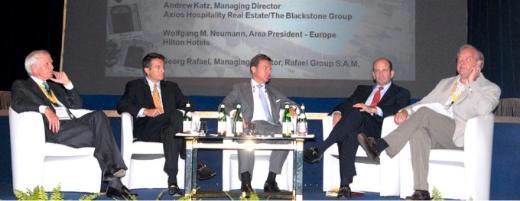Discussions at the International Hotel Conference Rome
Rome (November 7, 2008). Small boutique hotels could take advantage of the ongoing financial crisis. Major chains are struggling in operating hotels with low room numbers. And the crisis also benefits budget hotels. The number of low-budget hotels will keep on growing. Findings from two panel discussions at the International Hotel Conference Rome.

Acknowledging that the boutique hotel sector had the highest chance of failure, panellists discussing successful strategies for boutique hotels also agreed that in the current economic climate there exists a great opportunity as more guests are seeking the higher service levels and a more experiential stay that this sort of small hotel can offer.
The expected flight to the security of brands begged the question of whether or not boutique hotels could be successfully branded. An obvious success story for the branded boutique sector, as suggested by Georg Rafael, Managing Director of Rafael Group S.A.M., is Aman Resorts with founder Adrian Zecha ensuring that no hotel is greater than 40 rooms. Currently working with Orient Express, Rafael acknowledged that this group had acquired some rather larger iconic hotels (such as the Mount Nelson, Cape Town and Copacabana Palace, Rio de Janeiro where "the opportunities could not be missed") but that the key to success was in keeping the philosophy of service alive. "The GM has to act like an owner," he explained.
Fairquest Hotels, a new boutique hotel management company established by panellist Blanche van Berckel, Managing Director, will not brand the hotels they manage (www.fairquesthotels.com). Rather they will use the Fairquest name as a "discrete brand" name or mark of trust. Fairquest's first property, the Franklin in London`s Knightsbridge will open at the end of January 2009. After an extensive refurbishment, the hotel will be a full service offering with a final total of 60 staff providing service at a Four Seasons level but with only 40 rooms. "The hotel will compete on intimacy", stated van Berckel. The group expects to grow to between ten and 20 hotels and is currently looking closely at a number of family-run properties across Europe who could benefit from the experience van Berckel brings.
Nelson Migdal, a hotel lawyer with Greenberg Traurig, LLP in Washington DC saw that in the current economic crisis with even the large brands finding it difficult to raise finance, boutique hotels will be forced to look to the groups with multiple brand portfolios if they are to expand. Furthermore the power of brands is such that owners want their projects to benefit from the association and the economies of scale brands can bring. Van Berckel on the other hand was confident that her investor market would remain strong. The high net worth individuals making the investments were in fact also her guests. Additionally, they come from less effected, non-finance related industries.
Whilst the groups have been relatively successful in launching the boutique brands within their portfolios, particularly Starwood with W, van Berckel forecast that the groups will have a hard time bringing small hotels to market. Size being the defining characteristic of boutique hotels. Migdal saw that the groups did however want to capture their share of every market and therefore the boutique sector will continue to grow.
Suggested strategies for boutique hotel success included:
- A return to core values;
- Proper staff training to deliver an honest service;
- A need for intelligent design and to look to the totality of a concept;
- Food and beverage flexibility and the use of big-draw, named chefs;
- A spa offer, that includes treatments for men;
- More appeal to women with issues of safety and security to the fore;
- The greater use of CRM.
The European budget hotel sector was the most resilient agreed the panellists discussing this and the mid-market sector. "Budget hotels in Europe are ideally positioned to benefit from the current crisis as travel budgets are cut and travellers trade down tier by tier", explained Mark Dickens, Managing Director, TRI Hospitality Consulting. The mature American budget sector would likely suffer more given its plethora of brands. Tim Muir, Senior Vice President Sales and Development, Microtel and Hawthorne Suites, with some 300+ franchised hotels in the US, nevertheless still saw plenty of upside in the US.
Andrew Shaw, Development Director UK & Ireland, Accor Hotels UK, explained that the "growth of our portfolio since the last recession means that we are everywhere and will be seen by those who continue to travel." The importance of a budget brand being part of a portfolio (e.g. Ibis and Etap) or a standalone brand (e.g. Microtel and Premier Inn) was not seen as significant. The fundamentals of site and demand were more important. Distinction between brands was essential explained Shaw with rate maintenance keeping separation and preventing cannibalisation between Accor's brands at their "villages". "We will hold out for rate and are prepared to take the hit on occupancy," he continued, detailing the dynamic upward-only pricing for Etap and Ibis.
New markets seen by Dickens in the UK are hen and stag parties, visiting friends and family and people staying over after evening work functions rather than commuting home late at night. In the UK the taxi fare home can exceed the cost of the stay. The Generation Y group are an untapped market currently unexcited by the current budget offer and are looking at "sexier" products such as CitizenM in Schiphol Airport. In addition to the budget hotels stealing market share from the independent and bed & breakfast sector, there was also an opportunity to brand such guesthouses. / Guy Dittrich
Continuative Links:
- EVENTS / Crisis? What Crisis? International Hotel Conference Rome tried to find answers
- EVENTS / Crisis? What Crisis? International Hotel Conference Rome tried to find answers
To print this article you have to be registered and logged in for newsletter, visitor or subscription.





